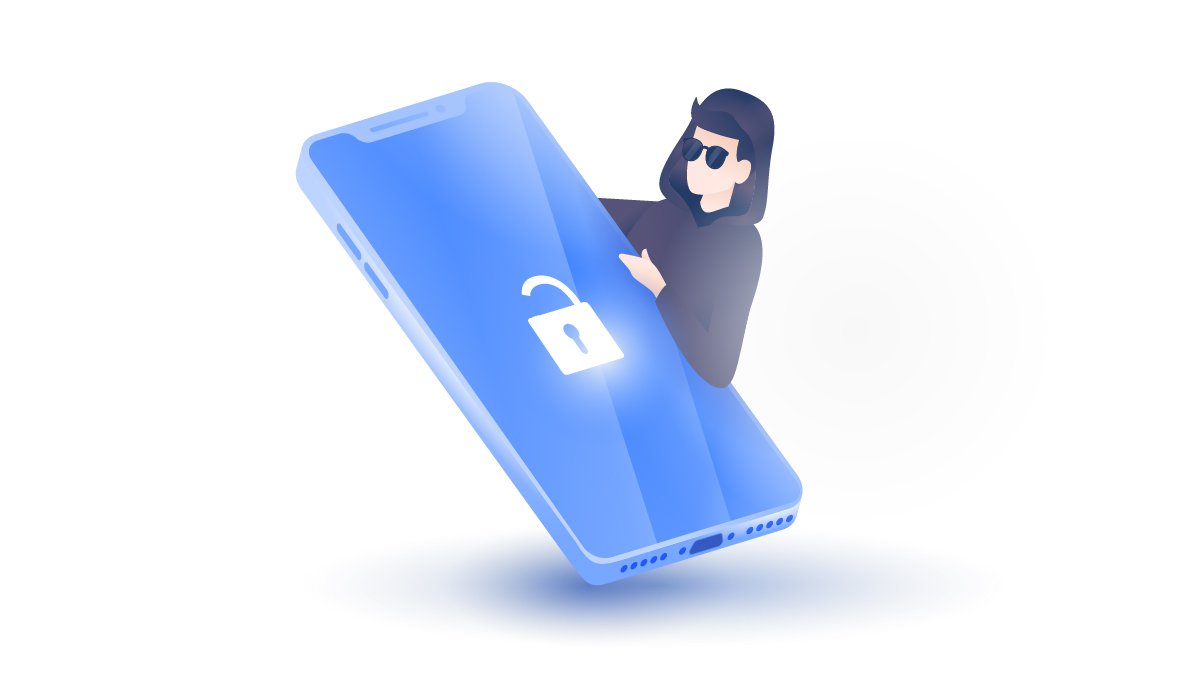Is my phone listening to me?
Have you ever noticed your Facebook ads changing after you mentioned something in a conversation? Like that time you were discussing an upcoming hiking trip with your partner and started seeing ads of sleeping bags and tents. Or when you were considering getting a dog and were immediately bombarded with pages for animal lovers. Is it a coincidence, or are our phones listening to us?
Carlos Martinez
Dec 29, 2021 · 5 min read

Contents
- Is it true that my phone is listening to me?
- Is my phone listening to me? A simple experiment.
- Why is my phone listening to me?
- Is listening to me without my knowledge legal?
- How to make my phone stop listening to me
- How to turn off your microphone on iPhone and Android devices
- 5 tips to protect your privacy on a smartphone
Is it true that my phone is listening to me?
In 2011, Apple introduced Siri, the first virtual assistant designed for iPhones. It paved the way for Alexa, Cortana, and many others. They listen to your voice all the time and, after you trigger a special command, recognize you so you can make calls, send texts, ask questions, and control your device.
We can definitely say that your phone is listening to you via your device's onboard microphone. It always has to listen to you so it can hear your voice command and assist you. However, things are not that simple.
Apple randomly selects a small portion of users’ conversations with Siri to analyze them and see how they can improve the quality of their service. In 2019, a report revealed that Siri can sometimes be mistakenly activated and record private matters, such as people having sex, discussing business, and even talking with their doctors, all of which might later be passed on to contractors responsible for analyzing voice recordings. Apple apologized to its users and promised to improve its policies and default settings. But Siri’s case is not an exception, as Amazon’s Alexa and Google Assistant are using similar systems and default settings.
Is my phone listening to me? A simple experiment.
If you still think your phone is listening to you, there's a simple test that you can try. From your phone's settings, disable mic access for all of your apps. (Like Facebook's microphone access for example, which you can find in your iOS device's settings). Next, try talking about a product out loud with a friend that you haven't ever searched for on any of your devices. Your targeted ads shouldn't be based on anything that you've just spoken about.
Why is my phone listening to me?
When you ask Google Assistant or Siri to find something, this information is used for targeted ads. It’s no different from typing something into Google Search. If you’re looking for car dealerships in your city, related ads will start chasing you across the internet. In a way, a virtual assistant is just another search engine.
A VPN service will surely give you more privacy when you use your phone. It will encrypt your traffic and hide your IP. You can easily install the app in desktop and mobile devices and use it on all of them simultaneously. With a single NordVPN account you can protect up to 6 devices.
Is listening to me without my knowledge legal?
When you’re using a virtual assistant, you agree to the terms and conditions of the service provider. And if you’ve given your consent in your Google assistant settings, for instance, it’s legal to track your conversations with Google Assistant, Siri, or Alexa for marketing purposes.
It only becomes illegal if an app is spying on you without your consent. That’s why it’s important to review the permissions you’re giving to certain services and learn about the ways your phone is tracking you. If the photo editor you just downloaded asks to access your microphone, consider it fishy, as it can record your voice in the background and use this information for malicious purposes.
How to make my phone stop listening to me
A virtual assistant is just another feature on your smartphone, speaker, watch, or any other device. If you don’t use it or feel unsafe, you can disable it.
How to turn off your microphone on iPhone and Android devices
How to disable “Hey Siri” on iOS:
- Go to Settings > Siri & Search.
- Toggle off Listen for “Hey Siri”, Press Side Button for Siri, and Allow Siri When Locked.
- Tap on Turn Off Siri in the pop-up.
How to disable “Ok Google” on Android:
- Go to Settings.
- Select Google > Account Services > Search, Assistant & Voice > Voice.
- Select Voice Match and toggle off Hey Google.
Other ways to turn of the microphone on your phone
There are a few other steps you can take to limit microphone activity on your device.
For example, you can edit the audio permissions for individual apps on your phone. Most applications that use your microphone in some way can have their access revoked in your settings. Remember that removing microphone permissions may limit certain apps' overall functionality.
There are also a range of more physical solutions available. The microphone on your device can be covered, preventing it from effectively picking up or recording nearby audio.
You can use small stickers and pieces of tape to at least partially limit the microphone's range, or buy specialized phone cases and attachments. Before purchasing any products that claim to block microphones, however, read all available reviews; there are plenty of substandard options online.
5 tips to protect your privacy on a smartphone
- Only download virtual assistant apps from official stores. Google Assistant and Siri are the most popular options among smartphone users, but there are a handful of more specialized virtual assistants. Some people download them from questionable sources and risk installing malware.
- Review app permissions. Check your phone settings and review the permissions you’ve given to your apps. If some of them can access your microphone for no solid reason, it’s a red flag.
- Delete your voice request history. While Siri claims not to keep your voice request history, Google Assistant does. If you were to lose your phone, somebody malicious could extract your search results.
- Use a VPN. A virtual private network masks your IP address and encrypts traffic, to enhance your privacy. If you’re looking for ways to stay away from snoopers and hackers, get the NordVPN app. It works by wrapping your phone with an encrypted secure layer, mitigating the risks of being attacked online. (Note: It won't affect voice monitoring services that you have authorized)
- Update your software regularly. Hackers exploit known software vulnerabilities while developers patch security flaws to be one step ahead. Updates are boring, but they enhance your privacy immensely.
Speaking of app permissions, inspect your phone every so often for apps that you don't recognise. Sometimes, if you've fallen for a phishing attack, clicked on a dodgy link or ad somewhere, or downloaded malware instead of a legitimate file from a website – you could have spyware on your phone.
Spyware and malware can sometimes get installed onto your phone via various scams and phishing attacks. And often this spyware can be disguised inside an app that forces itself onto your device, and secretly runs in the background, spying on your every move. So make sure you routinely check for rogue apps and delete them immediately.
So, you might be wondering, “What does Google know about me? The short answer is: a lot.
Google, and other unencrypted search engines monitor your search terms, and all of the websites you visit. This data is often sold to advertisers who build consumer profiles and target you with 'relevant' ads. This is also known as re-targeting.
Your ISP also knows your IP address as well as everything you do online, which could reveal intimate details about you, like your location.
NordVPN encrypts your traffic with a high-end encryption, hides your IP, thus no one can see where you are and what you do online. With just a single click you can enjoy top-notch protection and privacy.


